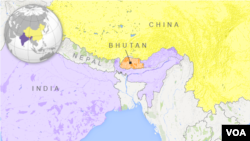NEW DELHI —
On a visit to Bhutan, Indian Prime Minister Narendra Modi has pledged to build stronger ties with the neighboring Himalayan country wedged between India and China. The visit is being seen as an effort by the new government to counter China’s growing influence in India’s neighborhood.
During his two-day stop in the Bhutanese capital, Thimphu, Indian Prime Minister Narendra Modi laid the foundation of a 600 megawatt hydroelectric power station to be built jointly, opened a Supreme Court building made with Indian assistance, and assured Bhutan of continuing support for the tiny country’s development.
He told the Bhutanese parliament that India is committed to good relations with its neighbors.
Modi said stability and development in India will help all countries in the South Asian region. He said a weak India will not be able to assist small countries in its neighborhood.
Stregthening ties
Prime Minister Modi’s decision to make Bhutan his first "port of call" since taking over as prime minister is regarded as part of his emphasis on strengthening ties with neighboring countries. In an unusual gesture, he had invited the heads of all South Asian nations to attend his swearing-in-ceremony last month.
Analysts in New Delhi say India’s new government is reaching out to neighbors to reassert its influence in South Asia, which has waned in recent years. This had helped China make inroads into countries like Nepal, Sri Lanka and Bangladesh by offering to build ports, roads and using its economic clout to make other investments.
India also had a dispute with Bhutan last year when it cut fuel subsidies to the country, seen as a mark of New Delhi’s anger with the Himalayan country’s effort to engage with Beijing. The subsidies were later restored.
Disputed border
Security analyst Bharat Karnad at the Center for Policy Research in New Delhi said the trip to Thimphu has been made with an eye on China, with which Bhutan shares a common border.
“Bhutan is in a few weeks time, going to be negotiating with the Chinese about their disputed border. So that is some slight worry -- that the Bhutanese not tip over on to the Chinese side. So this is one way of trying to generate goodwill, keep them on our side, keep them pacified with offers of development assistance,” said Karnad.
The Indian leader called for more responsive financial assistance for Bhutan and suggested doubling of scholarships given to Bhutanese students in India. Modi spoke of developing tourism as a means to help poor people.
For Bhutan, a tiny, landlocked country in the high Himalayas, more development assistance could be crucial. Although the country has remained largely aloof from the outside world and focuses on using an index called “gross national happiness” to measure progress, the government admits it also needs to focus on the obstacles to happiness as it grapples with high unemployment and growing national debt.
During his two-day stop in the Bhutanese capital, Thimphu, Indian Prime Minister Narendra Modi laid the foundation of a 600 megawatt hydroelectric power station to be built jointly, opened a Supreme Court building made with Indian assistance, and assured Bhutan of continuing support for the tiny country’s development.
He told the Bhutanese parliament that India is committed to good relations with its neighbors.
Modi said stability and development in India will help all countries in the South Asian region. He said a weak India will not be able to assist small countries in its neighborhood.
Stregthening ties
Prime Minister Modi’s decision to make Bhutan his first "port of call" since taking over as prime minister is regarded as part of his emphasis on strengthening ties with neighboring countries. In an unusual gesture, he had invited the heads of all South Asian nations to attend his swearing-in-ceremony last month.
Analysts in New Delhi say India’s new government is reaching out to neighbors to reassert its influence in South Asia, which has waned in recent years. This had helped China make inroads into countries like Nepal, Sri Lanka and Bangladesh by offering to build ports, roads and using its economic clout to make other investments.
India also had a dispute with Bhutan last year when it cut fuel subsidies to the country, seen as a mark of New Delhi’s anger with the Himalayan country’s effort to engage with Beijing. The subsidies were later restored.
Disputed border
Security analyst Bharat Karnad at the Center for Policy Research in New Delhi said the trip to Thimphu has been made with an eye on China, with which Bhutan shares a common border.
“Bhutan is in a few weeks time, going to be negotiating with the Chinese about their disputed border. So that is some slight worry -- that the Bhutanese not tip over on to the Chinese side. So this is one way of trying to generate goodwill, keep them on our side, keep them pacified with offers of development assistance,” said Karnad.
The Indian leader called for more responsive financial assistance for Bhutan and suggested doubling of scholarships given to Bhutanese students in India. Modi spoke of developing tourism as a means to help poor people.
For Bhutan, a tiny, landlocked country in the high Himalayas, more development assistance could be crucial. Although the country has remained largely aloof from the outside world and focuses on using an index called “gross national happiness” to measure progress, the government admits it also needs to focus on the obstacles to happiness as it grapples with high unemployment and growing national debt.





